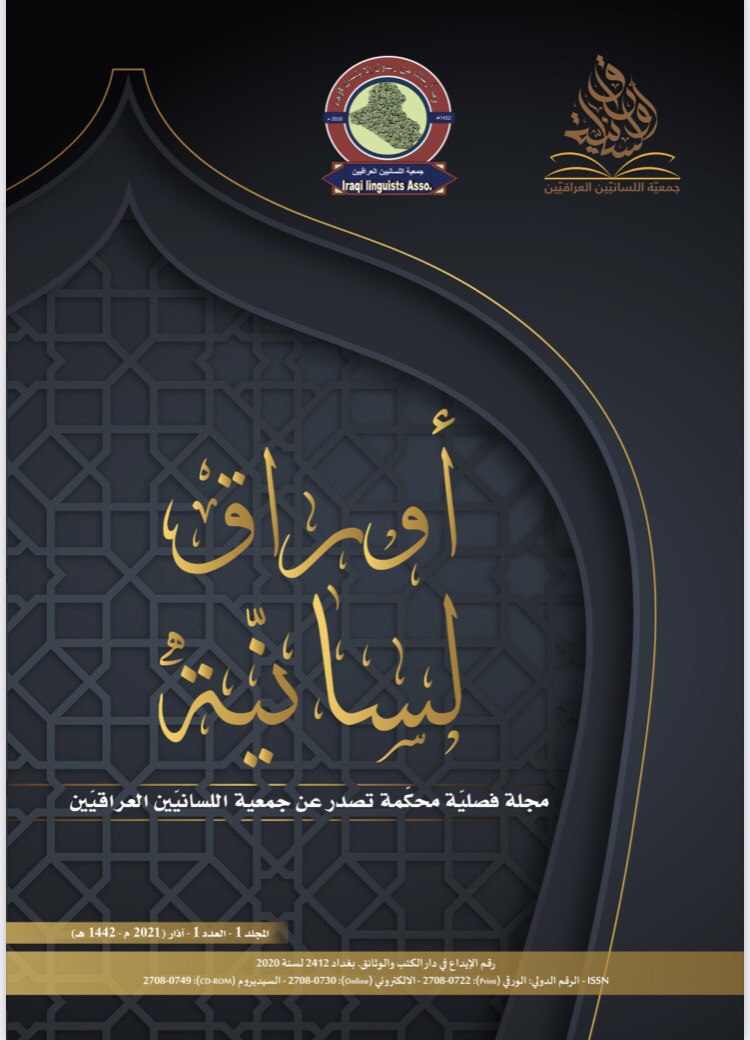Abstract
The Book of speeches and Sermons by Abu Ubaid Al-Qasim bin Salam is considered one of the most important heritage books that supports religious appeal and is based on advice, preaching, and urging deeds of righteousness. Because of the impact these speeches and sermons have on the Arab recipient, these speeches represent a special deliberative dimension within an interactive, communicative framework with the intended purpose. A single speech depends on the deliberative foundations of thought, which are: (the two sides of the speech, the intentionality, and the context). We find that the book of speeches and sermons was full of multiple and varied thought foundations, the multiplicity of which was linked to the multiplicity of the two sides of the speech, and their different levels, and their diversity came about according to the different contexts in which they were said in terms of time, and Place. Time and place are two important linguistic signs of discourse formation. The temporal given is only determined in the context of communication and at the moment of its utterance. Spatial space is the reference for determining locations and places to which spatial signs refer during their utterance to a place outside of a place. Communication: transporting the recipient to the time and place of the events is one of the most important techniques that the sender adopts in his speech. To benefit from them psychologically in influencing the recipients, and we do not find texts in the Book of Speech and Sermons that are supported by temporal and spatial denotations unless they have deliberative purposes that were produced in contexts intended to preach, so we find the senders of the speech in the Book of speech and Sermons relying on enhancing preaching to the recipients by temporal denotations. Spatial, except that it has deliberative purposes that were produced in contexts in which it is intended to preach. We find the senders of speech in the book of speech and sermons relying on enhancing the preaching to the recipients with temporal cues at times, and enhancing it with spatial cues, or both at times.
Abstract
يعد كتاب الخطب والمواعظ لأبي عبيد القاسم بن سلَّام من أهمّ الكتب التَّراثيَّة الرَّافدة بالاستدعاء الدِّينيّ والمعقودة بالنُّصح، و الوعظ، و الحضّ على أعمال البرّ؛ لما لهذه الخطب والمواعظ من أثر في المتلقِّي العربيّ فتمثّل هذه الخطابات بعدًا تداوليَّا خاصًّا في إطار تفاعليّ تواصليّ مبتغاه القصد؛ فالخطاب الواحد مرهون بأسس تفكيريَّة تداوليَّة و هي : (طرفا الخطاب، والقصديَّة، والسّياق) فنجد كتاب الخطب والمواعظ جاء حافلًا بأسس تفكيريَّة متعدّدة متنوّعة، ارتبط تعدّدها بتعدّد طرفيّ الخطاب، واختلاف مستوياتهم، و جاء تنوّعها باختلاف السِّياقات التي قيلت فيها من حيث الزّمان، و المكان.
فالزَّمان، و المكان هما علامتان لغويَّتان مهمَّتان من علامات تشكيل الخطاب، فالمعطى الزّمنيّ لا يتعيَّن إلّا في سياق التَّخاطب، و لحظة التَّلفظ به، و الفضاء المكاني هو مرجعيَّة تحديد المواقع، و الأماكن التي تحيل إليها الإشاريَّات المكانيَّة في أثناء التَّلفظ بها إلى مكان خارج مقام التَّخاطب، فالانتقال بالمتلقّي إلى زمان الأحداث، و مكانها معًا من أهّم تقنيات المرسل التي يعتمدها في خطابه؛ ليستفيد منهما نفسيًّا في التّأثير بالمتلقّين، و لا نجد نصوصًا في كتاب الخطب والمواعظ مدعومة بالإشاريَّات الزّمانيّة و المكانيّة إلَّا و لها مقاصد تداوليّة أُنتجت في سياقات يراد منها الاتّعاظ، فنجد مرسلو الخطاب في كتاب الخطب والمواعظ يستندون على تعزيز الوعظ عند المتلقّين بالإشاريَّات الزّمانيَّة تارة، و تعزيزها بالإشاريَّات المكانيَّة، أو بكليهما تارة.
فالزَّمان، و المكان هما علامتان لغويَّتان مهمَّتان من علامات تشكيل الخطاب، فالمعطى الزّمنيّ لا يتعيَّن إلّا في سياق التَّخاطب، و لحظة التَّلفظ به، و الفضاء المكاني هو مرجعيَّة تحديد المواقع، و الأماكن التي تحيل إليها الإشاريَّات المكانيَّة في أثناء التَّلفظ بها إلى مكان خارج مقام التَّخاطب، فالانتقال بالمتلقّي إلى زمان الأحداث، و مكانها معًا من أهّم تقنيات المرسل التي يعتمدها في خطابه؛ ليستفيد منهما نفسيًّا في التّأثير بالمتلقّين، و لا نجد نصوصًا في كتاب الخطب والمواعظ مدعومة بالإشاريَّات الزّمانيّة و المكانيّة إلَّا و لها مقاصد تداوليّة أُنتجت في سياقات يراد منها الاتّعاظ، فنجد مرسلو الخطاب في كتاب الخطب والمواعظ يستندون على تعزيز الوعظ عند المتلقّين بالإشاريَّات الزّمانيَّة تارة، و تعزيزها بالإشاريَّات المكانيَّة، أو بكليهما تارة.
Keywords
الإشاريّات الزّمانيّة، الإشاريَّات المكانيَّة، الإشاريّات الزّمكانيّة، الإشاريّات الزّمانيّة العامّة، الإشاريَّات المكانيَّة الخاصّة.
